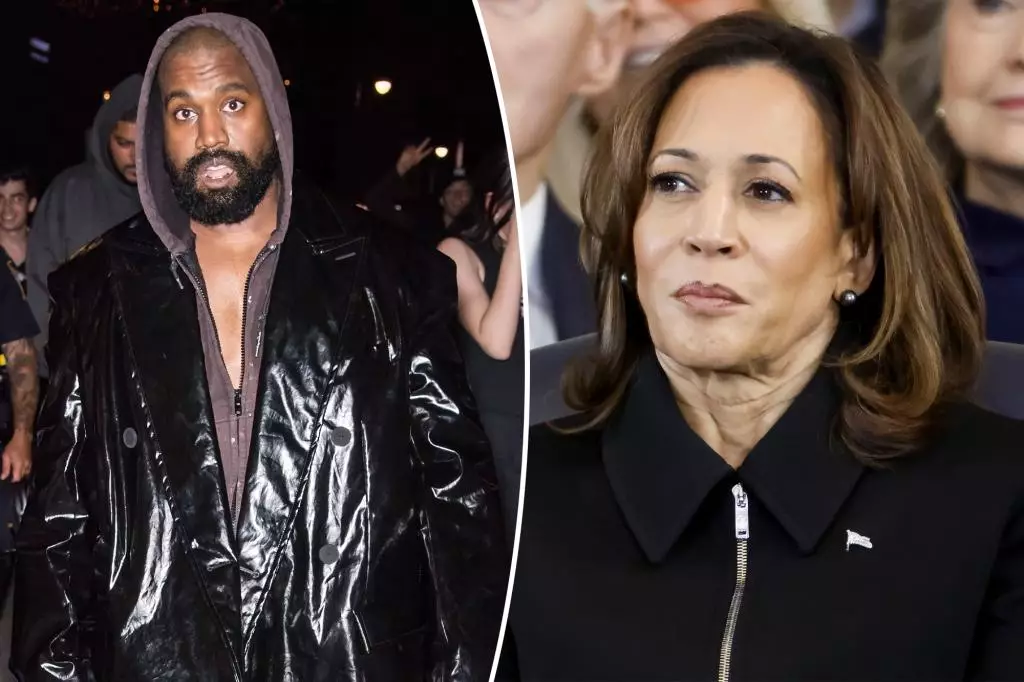In the age of social media, where thoughts can be broadcasted to millions in an instant, the responsibility of public figures to convey their messages thoughtfully has never been more crucial. Recently, Kanye West found himself at the center of controversy after posting a sexualized tweet regarding former Vice President Kamala Harris. This incident not only exposed the rapper’s penchant for provocative statements but also highlighted the inherent risks and ramifications of using such platforms for personal expression.
Kanye’s tweet, which crudely suggested a past interest in Harris before referencing her electoral defeat to Donald Trump in 2024, has since been deleted. His follow-up remarks dismissed the seriousness of his earlier comments and included a reference to control over “black people” that many found offensive. These statements illustrate a disconcerting trend in which controversial figures like West often blur the lines between humor, criticism, and disrespect, ultimately complicating public discourse. It’s worth asking whether his subsequent apology was sincere or merely a strategic move to mitigate backlash.
In an era where digital platforms wield immense power, West’s flippant remarks illustrate the potential desensitization that can occur. As he claimed, “Naw I’m kidding,” it became evident that he was unwilling to engage with the deeper implications of his words, prioritizing shock value over meaningful conversation. An apology that lacks genuine reflection raises questions about accountability and the importance of considering the impact of one’s words, especially for someone with a significant public following.
This incident does not exist in a vacuum; rather, it is the latest chapter in the complex relationship dynamics characterized by West’s public persona. While previously wed to Kim Kardashian, whom he notably mentioned in earlier critiques of Taylor Swift, it seems that West uses personal experiences as fodder for public amusement. The constant healing and harming that occur in such scenarios show a troubling cycle where public feuds and personal relationships are aired out on a global stage.
Furthermore, the timing of this tweet is noteworthy. Arriving just as Harris, a prominent political figure, had secured her role as a vice presidential candidate, reveals an underlying tone of misogyny inherent in the remarks. West’s statements reflect not only a disregard for Harris’s achievements but also a broader commentary on how women, especially in politics, are often objectified and disrespected by powerful men.
These tensions inevitably intersect with the history of Kanye West and Taylor Swift, whose relationship has been marred by interruption and misunderstanding since the infamous MTV VMA moment in 2009. The echoes of that moment still reverberate, as evidenced by West referencing Swift in a playful yet pointed manner as he continues to navigate the social media landscape.
West’s interactions resonate beyond mere celebrity gossip; they underscore a larger phenomenon wherein social media culture increasingly blurs the lines between robust discourse and sensationalism. With West’s remark about the world being “lucky” to have him, one must consider the interplay of self-aggrandizement and its effect on polity. Statements like these can inadvertently shape public perception, influencing not just celebrity culture but everyday communication patterns among followers and fans who may adopt similar rhetoric.
Moreover, the normalization of such crude language raises concerns about the lessons being imparted to younger audiences who consume this content as a form of entertainment. The implications of this erosion of discourse cannot be understated, especially in societies grappling with serious issues like systemic inequality, gender discrimination, and political polarization.
As Kanye West continues to define his multifaceted career, this incident serves as a stark reminder of the weight that words carry in our digital age. The challenge lies not only with celebrities who may find it easier to entertain than to engage but also within the public who, in many cases, uncritically absorb this material. It calls for a cultural shift toward fostering responsible discourse and encouraging individuals—both prominent and everyday—to consider the implications of their words in shaping society. Ultimately, it is crucial to embrace communication that promotes respect, understanding, and constructive dialogue rather than perpetuating cycles of offense, misunderstanding, and divisiveness.

